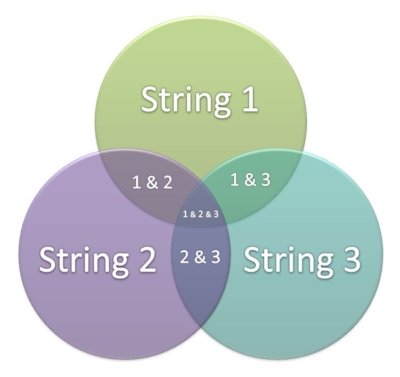Systematic Literature Review – combining your search strings
03/05/2024

Our previous posts on the systematic review have looked at:
- Systematic Literature Review – Where do I begin?
- Systematic Literature Review – Selecting your Sources
- Systematic Literature Review – Identifying your search terms and constructing your search strings
This post will discuss combining your search strings to create your search strategies.
Search Strategies
Once you have your search strings, the next step is to search using combinations of your search strings to identify literature which focuses specifically on aspects of your research topic. You can use the Boolean operators AND, OR and NOT to combine the search strings. Note: be wary of using the NOT operator as this will exclude any of the words in the NOT string from your search and may result in relevant articles being inadvertently excluded.
If we take the search strings from our previous post as an example, relevant articles might be found by searching for:
String 1 and String 2
(“supply chain*” OR “supply network*” OR “demand chain*” OR “demand network*” OR “value chain*” OR “value network*”) AND (“lead time compression” OR “lead time reduction” OR “cycle time compression” OR “cycle time reduction” OR “dwell time compression” OR “dwell time reduction”)
String 1 and String 3
(“supply chain*” OR “supply network*” OR “demand chain*” OR “demand network*” OR “value chain*” OR “value network*”) AND (agil* OR “quick response” OR speed*)
String 2 and String 3
(“lead time compression” OR “lead time reduction” OR “cycle time compression” OR “cycle time reduction” OR “dwell time compression” OR “dwell time reduction”) AND (agil* OR “quick response” OR speed*)
String 1 and String 2 and String 3
(“supply chain*” OR “supply network*” OR “demand chain*” OR “demand network*” OR “value chain*” OR “value network*”) AND (“lead time compression” OR “lead time reduction” OR “cycle time compression” OR “cycle time reduction” OR “dwell time compression” OR “dwell time reduction”) AND (agil* OR “quick response” OR speed*)
The diagram below illustrates how your strings above could be put together.

Which fields should I search in?
Researchers should usually avoid searching the full text field, opting instead to search, for example, the abstract, title and keyword fields when carrying out their systematic review. Searching the full text field may produce too many results and reduce the relevance. Restricting to just one of the fields mentioned above may produce too few results.
I’m receiving too many results…
If your search retrieves too many results or too many irrelevant results, the AND operator can be replaced by a proximity operator, e.g., N/n*, Nn* or W/n*. Using a proximity operator signifies that your search terms must appear within a defined number of words of each other. An example of a search in Scopus could be:
(“supply chain*” OR “supply network*” OR “demand chain*” OR “demand network*” OR “value chain*” OR “value network*”) W/3 (agil* OR “quick response” OR speed*)
Only papers where (“supply chain*” OR “supply network*” OR “demand chain*” OR “demand network*” OR “value chain*” OR “value network*”) appear within three words of (agil* OR “quick response” OR speed*) and vice-versa will be returned in the results. This will not only reduce the number of results but may also increase relevancy.
If you wish to specify the order your search terms appear in your results, Scopus offers the PRE/n* operator. An example of a search could be:
(“supply chain*” OR “supply network*” OR “demand chain*” OR “demand network*” OR “value chain*” OR “value network*”) PRE/3 (agil* OR “quick response” OR speed*)
In this example, only papers where (“supply chain*” OR “supply network*” OR “demand chain*” OR “demand network*” OR “value chain*” OR “value network*”) precedes (agil* OR “quick response” OR speed*) within three words, will be returned in the results.
A proximity operator is a good way to give context to two keywords, where a phrase may be too restrictive. For example, you may find that some papers do not use the exact phrase “lead time reduction”, but instead word it as, e.g., ‘reducing the lead time’. If you use the phrase “lead time reduction”, papers discussing how they ‘reduced the lead time’ would not be returned. However, if you use a proximity operator, e.g., in Scopus: reduc* W/3 “lead time”, papers that mention “lead time reduction” and papers that mention ‘reducing the lead time’ or ’the lead time was reduced by’ will be returned in your results.
The proximity operator syntax varies between databases; Scopus uses W/n* and PRE/n*, ProQuest One Business uses N/n* and P/n*, EBSCO uses Nn*and Wn*, and Web of Science uses NEAR/n*. Not all databases offer a proximity operator function. Check the search tips of your favourite databases to find out which functions are available.
*n = number
Further help
Carrying out a systematic literature review is an iterative process, and to do it well takes time. Simply identifying the keywords and search strings can take several attempts and requires patience. You may think you have the perfect search strings but then find that they produce too many results or none at all. If this is the case, something may have gone wrong either in terms of:
- the keywords being used,
- the way the keywords are being combined to make a search string,
- the way in which the search strings are being combined with each other.
Sometimes the only way to identify this is to systematically go through each search string one at a time, removing and adding words until the problem is identified. Alternatively, you may not have understood the way in which the database you are using works, e.g., are you using the correct operators? Are you searching the appropriate fields? Have you forgotten the quotation marks around phrases?
Other blog posts you may find useful
- Systematic Literature Review – Where do I begin?
- Systematic Literature Review – Selecting your Sources
- Systematic Literature Review – Identifying your search terms and constructing your search strings
Contact us
Because of the complexity of this process, we recommend that before embarking on a systematic literature review you contact the Library and we will be happy to provide guidance.
Categories & Tags:
Leave a comment on this post:
You might also like…
Keren Tuv: My Cranfield experience studying Renewable Energy
Hello, my name is Keren, I am from London, UK, and I am studying Renewable Energy MSc. My journey to discovering Cranfield University began when I first decided to return to academia to pursue ...
3D Metal Manufacturing in space: A look into the future
David Rico Sierra, Research Fellow in Additive Manufacturing, was recently involved in an exciting project to manufacture parts using 3D printers in space. Here he reflects on his time working with Airbus in Toulouse… ...
A Legacy of Courage: From India to Britain, Three Generations Find Their Home
My story begins with my grandfather, who plucked up the courage to travel aboard at the age of 22 and start a new life in the UK. I don’t think he would have thought that ...
Cranfield to JLR: mastering mechatronics for a dream career
My name is Jerin Tom, and in 2023 I graduated from Cranfield with an MSc in Automotive Mechatronics. Originally from India, I've always been fascinated by the world of automobiles. Why Cranfield and the ...
Bringing the vision of advanced air mobility closer to reality
Experts at Cranfield University led by Professor Antonios Tsourdos, Head of the Autonomous and Cyber-Physical Systems Centre, are part of the Air Mobility Ecosystem Consortium (AMEC), which aims to demonstrate the commercial and operational ...
Using grey literature in your research: A short guide
As you research and write your thesis, you might come across, or be looking for, ‘grey literature’. This is quite simply material that is either unpublished, or published but not in a commercial form. Types ...






